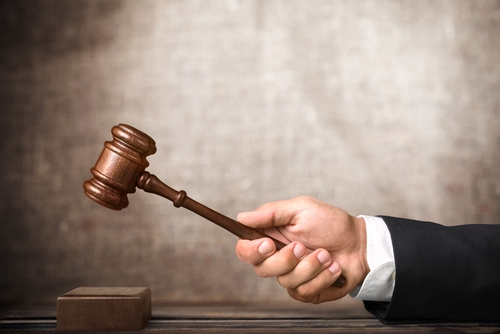Pro se defendant's grandiose remarks not disqualifying, 4th Circuit says; some trial lawyers are 'outright narcissists'

Image from Shutterstock.
A defendant who made grandiose statements while defending himself was of the same ilk of many great trial lawyers who are somewhat full of themselves, a federal appeals court concluded in upholding his conviction.
The 4th U.S. Circuit Court of Appeals at Richmond, Virginia, ruled that a trial judge did not abuse his discretion when he allowed Joseph Ziegler to represent himself on a charge of impersonating a federal officer.
The Legal Profession Blog has highlights from the June 14 opinion.
Ziegler was prosecuted for falsely claiming that he was an assistant U.S. attorney after he crashed his car and tried to avoid an arrest on charges of drunken driving and driving without a license, insurance or vehicle registration.
Judge Julius Richardson, who’s an appointee of former President Donald Trump and a former federal prosecutor, wrote the unanimous panel opinion rejecting Ziegler’s arguments on appeal.
“Ziegler contends that his grandiose statements about his legal acumen, his combative approach to witnesses, his bizarre questions and theories, and his arguments with the court should have raised red flags. We disagree,” the appeals court said. “Many great trial lawyers are combative and a bit full of themselves, if not outright narcissists.”
Ziegler told a judge that he should be allowed to represent himself because he had studied law and had a degree in criminal justice. Ziegler also said he had represented himself once before, getting the conviction reversed because “the prosecution got caught falsifying transcripts.”
Ziegler said he has “published cases in which I’ve represented myself. I’m very familiar with all 27 amendments of the United States Constitution, various SCOTUS cases, and I’ve successfully assisted prisoners inside of jails and prisons across America.” He also claimed familiarity with “writs of habeas corpus, coram nobis and the like.”
In reality, Ziegler’s other pro se conviction was reversed because a judge failed to follow proper statutory procedures in allowing the self-representation. After Ziegler filed pretrial motions in the impersonation case, the judge counseled Ziegler to allow a public defender to represent him.
“It’s obvious to me that you’re not a sophisticated person as far as your knowledge of the law,” a trial judge told Ziegler.
The defendant stood his ground, however, and was allowed to represent himself.
At trial, Ziegler cross-examined government witnesses extensively, asking several strange questions, while arguing with witnesses and the judge.
“But he also gave opening and closing arguments, made good points on cross, had objections sustained, and introduced evidence, including three witnesses,” according to the opinion.
After his conviction, Ziegler argued that he needed a psychological evaluation. A judge refused to grant a new trial and sentenced Ziegler to time served. Ziegler appealed, arguing in part that he should not have been allowed to represent himself.
“While not always accurate, Ziegler’s statements reflected his ability to consider legal concepts and strategy, even if those concepts and strategies were ill-advised,” the 4th Circuit said.
Ziegler’s trial performance only confirmed his competency, Richardson wrote.
“In fact, Ziegler did quite well for someone proceeding pro se. His apparent ability to consider strategic choices, develop a defense strategy, and operate in the courtroom is all evidence of competence to both stand trial and waive the right to counsel,” Richardson said.



